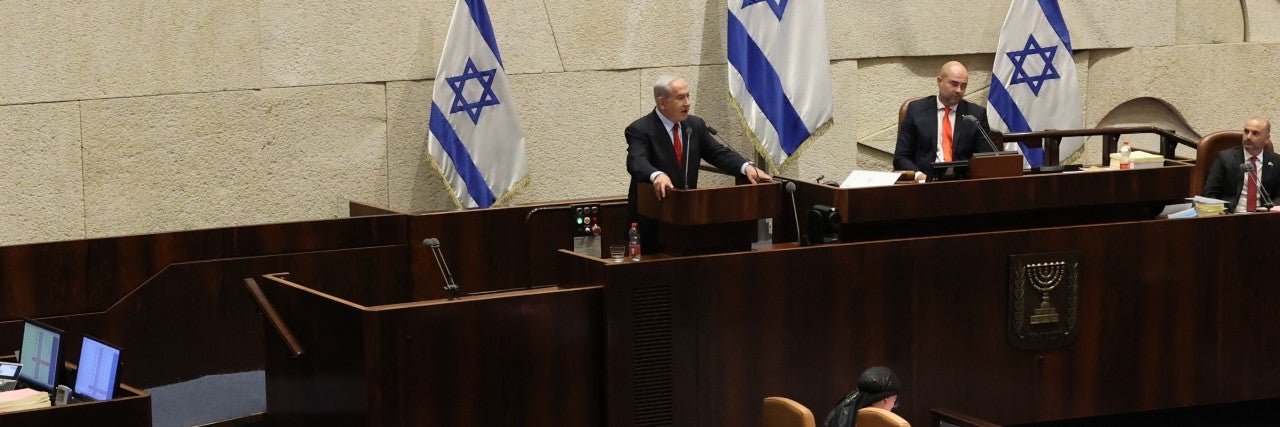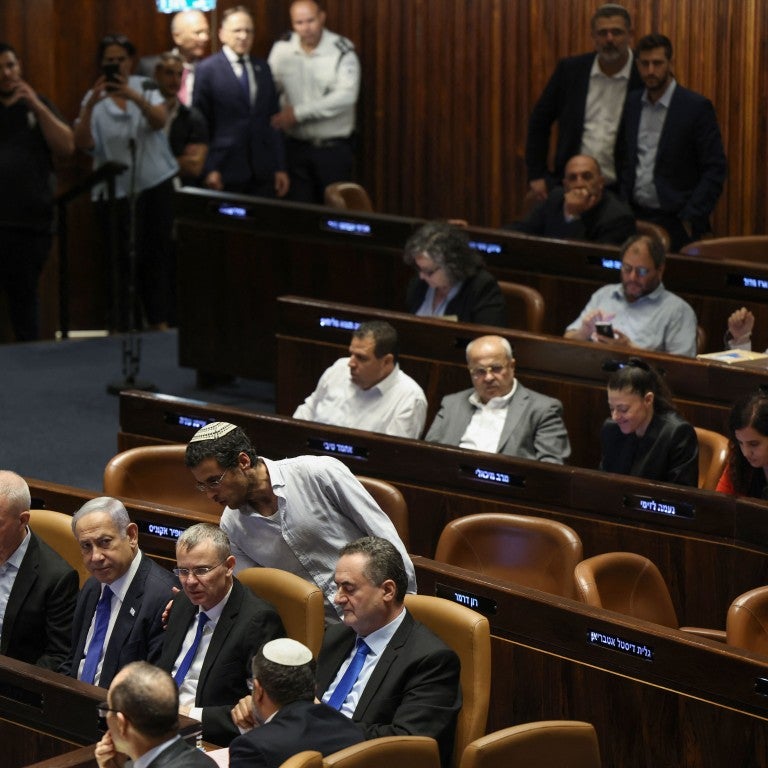July 23, 2023
The Israeli Knesset (Parliament) has passed legislation that would limit the High Court of Israel’s ability to review the “reasonableness” of government decisions. This highly contentious legislation is part of a larger debate in Israel over reforms to the country’s judiciary.
Over the last six months, hundreds of thousands of Israeli citizens, in a country of just over nine million, have taken to the streets of Tel Aviv and other major cities each weekend to protest the reforms and other aspects of the current government. This protest movement has ramped up demonstrations against the legislation, with some 200,000 demonstrating across the country ahead of the proposal’s expected second reading at the Knesset. Opposition to the legislation has also spread across key sectors of Israeli society, with business leaders, labor leaders, physicians, and even members of the Israel Defense Forces reserves. Over 10,000 IDF reservists from dozens of units have said they would end their volunteer duty if the government passes the legislation, leading to fears that it could hamper the IDF’s preparedness and cohesion.
Below is a breakdown of the new law, why it is so contentious, and AJC’s position. Click here to read more about the overall judicial reform effort, the protests it has prompted, and AJC’s take.
What is in the new law and what is its status in the Knesset?
The law would specifically prohibit Israeli courts from using what’s called the “reasonableness doctrine” to review decisions made by the Israeli cabinet, government ministers, and other unspecified “elected officials, as determined by law.”
The legislation was drawn up by MK Simcha Rothman (Religious Zionism) and was approved by the Knesset Constitution, Law, and Justice Committee on July 4. The legislation was advanced with nine committee sessions preparing the core text of the substantive amendment to Israel’s quasi-constitutional Basic Laws. Israel does not have a written constitution and its Basic Laws serve as the foundation for the country’s legal system and government structure.
The Knesset on July 11 passed the first reading of the law in a 64-56 vote. On July 24, the legislation passed the second and third readings with a majority of 64 votes in favor, thereby enacting the legislation into law. The opposition boycotted the final vote.
What is the history of the reasonableness doctrine under Israeli law?
The reasonableness standard in Israeli law finds its roots in various legal traditions and influences. Israel's legal system draws inspiration from Jewish law (Halakha), British common law, and legal principles adopted by other Western legal systems.
Jewish law has a long history of emphasizing reasonableness and fairness in legal decision-making. The principle of "derech eretz" (literally, "the way of the land") in Jewish law encompasses ethical conduct and reasonable behavior. It guides individuals to act in a manner that is just, equitable, and considerate of others.
Influences from British common law, which had a significant impact on the development of Israeli law, also shaped the reasonableness standard. The British legal system, with its emphasis on reasonableness, fairness, and the "reasonable person" standard, has been influential in many legal jurisdictions worldwide.
The Israeli legal system further incorporated these concepts through the adoption of British legal principles during the Mandate period (1920-1948). During this time, the British Mandate authorities introduced English law into the legal framework of the land that would later become the State of Israel. The British legal system's concepts, including the reasonableness standard, were thus integrated into Israeli jurisprudence.
Over time, Israeli courts have continued to develop and refine the reasonableness standard based on Israeli case law, legal scholarship, and comparative legal analysis. The standard has been applied across various areas of Israeli law, such as tort law, administrative law, and contract law, to assess the reasonableness of actions, decisions, and behavior.
What do proponents of the reasonableness legislation say?
Supporters of the legislation argue that the current standard for judicial intervention is too subjective and, because it allows the High Court to subvert government authority, it contradicts the rule of law. Further, proponents say that such a broad judicial review of administrative action is also not seen in other democratic countries.
Elected officials, they say, are chosen by the voters to make decisions on matters great and small, and it is not for judges to decide questions of values. This has become particularly sensitive in regard to the appointment of government ministers, such as the decision earlier this year by the High Court to block Shas chairman Aryeh Deri as interior and health minister using the reasonableness doctrine. Proponents argue that it is the prime minister’s job to select members of their cabinet, and the judiciary is undemocratically interfering in the executive’s ability to govern.
Reasonableness, they say, has become one of the many expanded powers used by the “activist court” to undermine a democratically elected government.
From People of the Pod: Listen Now
What do opponents of the reasonableness legislation say?
Critics of the legislation, including Israel’s attorney general, say that “reasonableness” is an essential standard in the Israeli legal system and one of the few measures that the judiciary has to check on the excess of Israel’s heavily centralized executive branch of government. Canceling that standard, they say, would remove the only tool for reviewing arbitrary and highly unreasonable decisions by the government. This is made more important in countries without a written constitution, like Israel.
This would harm law enforcement and other agencies, including unreasonable appointments to key positions based on political or personal association. For example, the decision to appoint Aryeh Deri as health and interior minister by Prime Minister Benjamin Netanyahu was made despite his past criminal convictions. Deri, as part of his 2022 plea bargain, promised he would not return to public life. The High Court ruled that due to Deri’s criminal history – he has been convicted twice of crimes (2000, 2022) and served a stint in prison in 2002 – was “unreasonable in the extreme” and allowed the application of the reasonableness doctrine to disqualify him from serving as a minister.
As such, opponents of the bill fear that since the legislation is limited to elected officials, it could lead to a growth in corruption.
What is AJC’s view?
AJC expressed concern over the Knesset’s vote to advance one element of the governing coalition’s judicial reform package, deepening existing divisions instead of resuming the compromise negotiations conducted by President Herzog.
AJC continues to support President Herzog’s efforts to facilitate a compromise between the supporters and opponents of judicial reform. President Herzog today stated that an “agreement is attainable.” We urge the parties to heed his calls.
From the outset of the judicial reform process, AJC has expressed our firm belief that any changes to Israel’s judicial system should result from a deliberative, inclusive process that upholds the democratic values of maintaining checks and balances, respecting minority rights and civil liberties, and preserving essential judicial independence.
Following the law's passage, AJC issued a new statement. Please click here to read.
What are Israeli leaders saying?
Prime Minister Netanyahu said that curbing the ability of the High Court to use the reasonableness standard in reviewing government decisions would strengthen democracy.
“Even after the fix, the rights of the courts and Israeli citizens will not be harmed in any way,” Netanyahu said in a video statement. “The court will continue to inspect the legality of government decisions and appointments.”
Yair Lapid, former prime minister and current head of the opposition, has called on the government coalition to halt the legislation and renew negotiations on consensus changes to the Israeli judiciary. Similarly, a fellow member of the opposition, Benny Gantz of the National Unity party, also called for the resumption of talks.
Israeli President Isaac Herzog, who had been hosting talks over the judicial reforms between the government and opposition parties, reissued a similar call for the resumption of talks. Talks were halted in June over disagreements over the selection of members of the judicial nomination committee, another key aspect of the government’s judicial reform proposal. There are currently no plans to return to discussions right now.
“In the middle of a deep and worrying crisis, the responsible thing to do as a leader is to sit, talk and put Israeli unity before everything,” the president said.
In an interview with AJC CEO Ted Deutch at Global Forum 2023, Herzog said that maintaining the unity of the Jewish people, despite contentious issues like judicial reform, was important.
What is the United States saying?
U.S. President Joe Biden has urged Prime Minister Netanyahu to slow the process and achieve broad consensus before passing any meaningful constitutional changes. According to a White House readout from his call with Netanyahu on July 17, Biden reiterated “the need for the broadest possible consensus, and that shared democratic values have always been and must remain a hallmark of the U.S.-Israel relationship.”





